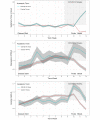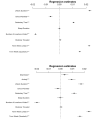Mental Health and Behavior of College Students During the Early Phases of the COVID-19 Pandemic: Longitudinal Smartphone and Ecological Momentary Assessment Study
- PMID: 32519963
- PMCID: PMC7301687
- DOI: 10.2196/20185
Mental Health and Behavior of College Students During the Early Phases of the COVID-19 Pandemic: Longitudinal Smartphone and Ecological Momentary Assessment Study
Abstract
Background: The vast majority of people worldwide have been impacted by coronavirus disease (COVID-19). In addition to the millions of individuals who have been infected with the disease, billions of individuals have been asked or required by local and national governments to change their behavioral patterns. Previous research on epidemics or traumatic events suggests that this can lead to profound behavioral and mental health changes; however, researchers are rarely able to track these changes with frequent, near-real-time sampling or compare their findings to previous years of data for the same individuals.
Objective: By combining mobile phone sensing and self-reported mental health data among college students who have been participating in a longitudinal study for the past 2 years, we sought to answer two overarching questions. First, have the behaviors and mental health of the participants changed in response to the COVID-19 pandemic compared to previous time periods? Second, are these behavior and mental health changes associated with the relative news coverage of COVID-19 in the US media?
Methods: Behaviors such as the number of locations visited, distance traveled, duration of phone usage, number of phone unlocks, sleep duration, and sedentary time were measured using the StudentLife smartphone sensing app. Depression and anxiety were assessed using weekly self-reported ecological momentary assessments of the Patient Health Questionnaire-4. The participants were 217 undergraduate students, with 178 (82.0%) students providing data during the Winter 2020 term. Differences in behaviors and self-reported mental health collected during the Winter 2020 term compared to previous terms in the same cohort were modeled using mixed linear models.
Results: During the first academic term impacted by COVID-19 (Winter 2020), individuals were more sedentary and reported increased anxiety and depression symptoms (P<.001) relative to previous academic terms and subsequent academic breaks. Interactions between the Winter 2020 term and the week of the academic term (linear and quadratic) were significant. In a mixed linear model, phone usage, number of locations visited, and week of the term were strongly associated with increased amount of COVID-19-related news. When mental health metrics (eg, depression and anxiety) were added to the previous measures (week of term, number of locations visited, and phone usage), both anxiety (P<.001) and depression (P=.03) were significantly associated with COVID-19-related news.
Conclusions: Compared with prior academic terms, individuals in the Winter 2020 term were more sedentary, anxious, and depressed. A wide variety of behaviors, including increased phone usage, decreased physical activity, and fewer locations visited, were associated with fluctuations in COVID-19 news reporting. While this large-scale shift in mental health and behavior is unsurprising, its characterization is particularly important to help guide the development of methods to reduce the impact of future catastrophic events on the mental health of the population.
Keywords: COVID-19; anxiety; app; behavior; depression; mental health; mobile sensing; pandemic; phone usage; sedentary.
©Jeremy F Huckins, Alex W DaSilva, Weichen Wang, Elin Hedlund, Courtney Rogers, Subigya K Nepal, Jialing Wu, Mikio Obuchi, Eilis I Murphy, Meghan L Meyer, Dylan D Wagner, Paul E Holtzheimer, Andrew T Campbell. Originally published in the Journal of Medical Internet Research (http://www.jmir.org), 17.06.2020.
Conflict of interest statement
Conflicts of Interest: None declared.
Figures



References
-
- Wang C, Pan R, Wan X, Tan Y, Xu L, Ho CS, Ho RC. Immediate Psychological Responses and Associated Factors during the Initial Stage of the 2019 Coronavirus Disease (COVID-19) Epidemic among the General Population in China. Int J Environ Res Public Health. 2020 Mar 06;17(5):1729. doi: 10.3390/ijerph17051729. https://www.mdpi.com/resolver?pii=ijerph17051729 - DOI - PMC - PubMed
-
- Liu X, Liu J, Zhong X. Psychological State of College Students During COVID-19 Epidemic. SSRN Journal. 2020 Mar 04;:Preprint. doi: 10.2139/ssrn.3552814. https://papers.ssrn.com/sol3/papers.cfm?abstract_id=3552814 - DOI
-
- Cao W, Fang Z, Hou G, Han M, Xu X, Dong J, Zheng J. The psychological impact of the COVID-19 epidemic on college students in China. Psychiatry Res. 2020 May;287:112934. doi: 10.1016/j.psychres.2020.112934. http://europepmc.org/abstract/MED/32229390 - DOI - PMC - PubMed
MeSH terms
Grants and funding
LinkOut - more resources
Full Text Sources
Medical
Miscellaneous

